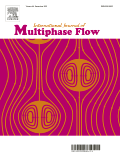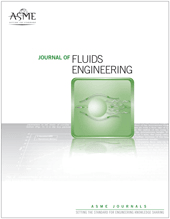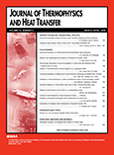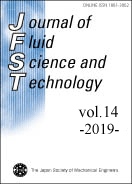
FDMP-Fluid Dynamics & Materials Processing
Scope & Guideline
Advancing Knowledge in Fluid Dynamics and Materials Processing
Introduction
Aims and Scopes
- Fluid Dynamics:
The journal extensively covers topics related to fluid behavior, including turbulence, multiphase flows, and heat transfer, often leveraging computational fluid dynamics (CFD) for simulations. - Material Processing:
Research on the processing of various materials, including concrete, polymers, and composites, is a core area. This includes studies on mechanical properties, durability, and innovative material formulations. - Numerical and Experimental Approaches:
A strong emphasis is placed on integrating numerical simulations with experimental validations, allowing for comprehensive analyses of fluid dynamics and material interactions. - Environmental and Energy Applications:
The journal explores the application of fluid dynamics in environmental engineering and energy systems, such as renewable energy technologies and pollution control. - Nanofluids and Advanced Materials:
There is a notable focus on nanotechnology and the development of advanced materials, particularly in the context of enhancing thermal and mechanical properties.
Trending and Emerging
- Computational Fluid Dynamics (CFD) Innovations:
There is a growing trend in utilizing advanced CFD techniques, including machine learning and artificial intelligence, to enhance simulation accuracy and efficiency in fluid dynamics. - Sustainable and Green Materials:
Research on sustainable materials, particularly those that incorporate waste or environmentally friendly components, is on the rise as industries seek to reduce their ecological footprint. - Nanotechnology in Fluid Dynamics:
The use of nanofluids in various applications, including heat transfer and energy efficiency, is increasingly prominent, highlighting the intersection of nanotechnology and fluid dynamics. - Energy Efficiency in Fluid Systems:
Emerging themes focus on optimizing energy use in fluid systems, including renewable energy applications and energy recovery methods, reflecting global sustainability efforts. - Advanced Manufacturing Techniques:
Research into innovative manufacturing processes, such as 3D printing and additive manufacturing, is gaining traction, particularly in the context of complex fluid-material interactions.
Declining or Waning
- Traditional Material Processing Techniques:
Research on conventional material processing methods has declined as interest shifts toward more innovative and sustainable practices, such as the use of nanomaterials and composites. - Single-Phase Flow Analysis:
Studies focused solely on single-phase flow dynamics are becoming less prominent as the journal emphasizes more complex multiphase and non-Newtonian fluid dynamics. - Basic Theoretical Fluid Dynamics:
Theoretical analyses without practical applications or experimental validation are seeing reduced publication rates, indicating a preference for applied research. - Low-Impact Environmental Studies:
Research focusing on low-impact or non-urgent environmental studies appears to be waning, as more urgent and impactful environmental issues gain attention.
Similar Journals

INTERNATIONAL JOURNAL OF MULTIPHASE FLOW
Connecting Scholars in Multiphase Flow ScienceINTERNATIONAL JOURNAL OF MULTIPHASE FLOW, published by Pergamon-Elsevier Science Ltd, is a premier platform dedicated to the dissemination of cutting-edge research in the field of multiphase flow. With an impressive impact factor and ranking in the Q1 category across various disciplines including Fluid Flow and Transfer Processes, Mechanical Engineering, and Physics and Astronomy, this journal serves as a crucial resource for researchers and professionals aiming to advance knowledge and applications in fluid dynamics. Since its inception in 1973, the journal has established a distinguished legacy, providing a venue for high-quality research articles, comprehensive reviews, and technical notes that push the boundaries of current understanding. Although it does not offer Open Access options, its rigorous peer-review process ensures that only the most relevant and significant contributions are published, making it a vital source for students and experts alike striving for excellence in their fields. The journal is based in Kidlington, Oxford, United Kingdom, and continues to be a pivotal part of scholarly discourse in multiphase flow research.

Frontiers in Heat and Mass Transfer
Advancing the Science of Energy and Material TransportFrontiers in Heat and Mass Transfer is a premier open-access journal published by TECH SCIENCE PRESS that focuses on the interdisciplinary field of heat and mass transfer. Established in 2010, this journal has been pivotal in disseminating high-quality research aimed at advancing the understanding of energy and material transport phenomena. With an impressive commitment to open access, it ensures that all published articles are readily available to researchers, practitioners, and students globally, promoting knowledge sharing and collaboration. The journal currently holds a Q3 ranking in key categories such as Engineering, Materials Science, and Physics and Astronomy, as well as notable positioning in Scopus rankings. With a forward-looking scope extending from 2010 to 2024, Frontiers in Heat and Mass Transfer continues to be an essential platform for innovative research, fostering the development of practical applications across various scientific and engineering domains. We invite you to explore the latest contributions to this evolving field and consider this journal as a vital resource for your academic and professional growth.

JOURNAL OF FLUIDS ENGINEERING-TRANSACTIONS OF THE ASME
Elevating Standards in Fluids Engineering ScholarshipJOURNAL OF FLUIDS ENGINEERING-TRANSACTIONS OF THE ASME, published by the renowned American Society of Mechanical Engineers (ASME), stands as a pivotal platform for disseminating cutting-edge research in the field of mechanical engineering, specifically focusing on fluid mechanics and its diverse applications. With an established history dating back to 1897, this journal features research that pushes the boundaries of knowledge and technology in areas such as fluid dynamics, thermal engineering, and hydrodynamics. Although it is not an open-access journal, it maintains rigorous peer-review standards, ensuring the publication of high-quality scholarly articles that contribute to the academic and professional community. In the latest rankings, it holds a respectable position within the Q2 category of mechanical engineering journals, reflecting its significant impact, as evidenced by its Scopus rank of #204 out of 672, placing it in the 69th percentile. Researchers, professionals, and students alike will find this journal to be a vital resource for the latest developments and innovative insights in fluids engineering.

JOURNAL OF ENGINEERING PHYSICS AND THERMOPHYSICS
Catalyzing Knowledge in Engineering Physics and ThermophysicsJOURNAL OF ENGINEERING PHYSICS AND THERMOPHYSICS, published by Springer, is a vital resource for researchers and professionals in the fields of engineering physics and thermophysics. With an ISSN of 1062-0125 and an E-ISSN of 1573-871X, this esteemed journal has been disseminating high-quality research since its inception, covering critical advancements in both condensed matter physics and various engineering disciplines. Despite its classification within the third quartile in both Scopus categories for 2023, the journal remains a significant conduit for innovative studies that push the boundaries of knowledge in thermal and physical engineering, with converged years spanning from 1992 to 1997 and 2004 to 2024. The journal does not offer open access, which means subscribers and institutions have exclusive access to its rich content. As the field continues to evolve, JOURNAL OF ENGINEERING PHYSICS AND THERMOPHYSICS plays an essential role in fostering scholarly discussions and supporting the academic community in tackling contemporary engineering challenges.

JOURNAL OF THERMOPHYSICS AND HEAT TRANSFER
Illuminating the Path of Thermophysical DiscoveriesJOURNAL OF THERMOPHYSICS AND HEAT TRANSFER, published by the American Institute of Aeronautics and Astronautics, serves as a vital platform for the dissemination of cutting-edge research in the fields of thermophysics and heat transfer. With an ISSN of 0887-8722 and an E-ISSN of 1533-6808, this journal has been pivotal in enhancing our understanding of heat transfer mechanisms since its inception in 1987, continuing through 2024. It occupies a noteworthy position in various academic categories, boasting Q2 rankings in both Fluid Flow and Transfer Processes and Mechanical Engineering, reflecting its significant contribution to the engineering and physical sciences community. Although it currently does not offer Open Access options, the journal’s repository of rigorous peer-reviewed articles remains accessible to researchers, professionals, and students eager to expand their knowledge and apply innovative findings in aerospace, condensed matter physics, and planetary sciences. Emphasizing both theoretical and experimental approaches, the JOURNAL OF THERMOPHYSICS AND HEAT TRANSFER remains an indispensable resource for advancing the frontiers of engineering and applied sciences.

Transactions of the Korean Society of Mechanical Engineers B
Connecting researchers with the latest in mechanical engineering.Welcome to the Transactions of the Korean Society of Mechanical Engineers B, a pivotal journal dedicated to advancing the field of mechanical engineering. Published by the esteemed Korean Society of Mechanical Engineers, this journal serves as a platform for the dissemination of innovative research and practical applications in mechanical engineering and related disciplines. With a focus on fostering knowledge exchange and collaboration, the journal publishes original research articles, reviews, and technical notes that contribute to the understanding and evolution of mechanical systems and technologies. The Transactions of the Korean Society of Mechanical Engineers B, which has been in circulation since 2007 and spans through 2024, is categorized within the Q4 quartile of mechanical engineering rankings and is indexed by Scopus, making it a valuable resource for researchers and professionals aiming to stay abreast of the latest developments in the field. Although it is not open access, its rigorous peer-review process ensures the integrity and quality of the published work, making it essential reading for academics and practitioners alike.

Propulsion and Power Research
Pioneering Research for Tomorrow's Propulsion Systems.Propulsion and Power Research, published by KEAI PUBLISHING LTD, is a leading Open Access journal that has been advancing the field of propulsion and power systems since its inception in 2012. With its commitment to fostering scientific discourse and innovation, the journal has gained a prominent position within academia, achieving a Q1 ranking in multiple categories such as Aerospace Engineering, Automotive Engineering, and Fluid Flow and Transfer Processes as of 2023. With an impressive ranking of #18 out of 153 in Aerospace Engineering and consistent recognition in the Scopus rankings, the journal explores critical advancements and research findings that propel the industry forward. As an Open Access publication, it ensures that groundbreaking research is readily available to a broad audience, enhancing collaboration between researchers, practitioners, and students. The journal's scope encompasses a wide range of topics within propulsion and energy solutions, making it an essential resource for anyone keen on discovering significant developments in this dynamic field.

International Journal of Fluid Mechanics Research
Connecting Researchers in the World of Fluid MechanicsThe International Journal of Fluid Mechanics Research, published by BEGELL HOUSE INC, is a pivotal platform for the dissemination of innovative research within the fields of Mechanical Engineering and Physics. With a focus on the intricate dynamics of fluid behavior, this journal has been a cornerstone of scholarly communication since its inception in 1996, continuing to engage a global audience of researchers and professionals through to 2024. With a respectable Impact Factor reflecting its significant contributions to the disciplines—ranking in Q3 for both Mechanical Engineering and Miscellaneous Physics and Astronomy categories—this journal presents a unique opportunity for authors to share their findings in a peer-reviewed environment. Although it does not currently offer Open Access options, all published articles are carefully curated, ensuring high-quality research is accessible to its readership. As the journal navigates the complexities of fluid mechanics, it fosters an interdisciplinary dialogue, bridging theoretical frameworks with practical applications, thereby enhancing understanding and innovation in related fields.

Journal of Fluid Science and Technology
Your Gateway to Cutting-Edge Fluid ResearchThe Journal of Fluid Science and Technology, published by the Japan Society of Mechanical Engineers, serves as a pivotal platform for the dissemination of cutting-edge research in the fields of fluid mechanics and mechanical engineering. With an ISSN of 1880-5558, this Open Access journal has been dedicated to advancing the understanding of fluid flow and transfer processes since its establishment. As of 2023, it holds a significant position with a Q3 quartile ranking in both Fluid Flow and Transfer Processes and Mechanical Engineering categories. Researchers and practitioners are encouraged to explore the journal’s extensive collection of articles, contributing to the body of knowledge that impacts various practical applications in engineering and technology. The journal, which has established a reputation for quality amidst a competitive landscape, further fosters international collaboration and education by providing unrestricted access to its content. For professionals and students alike, the Journal of Fluid Science and Technology represents an invaluable resource for the latest findings and innovations in fluid dynamics and mechanical systems.

PERIODICA POLYTECHNICA-MECHANICAL ENGINEERING
Where Cutting-Edge Research Meets Global CollaborationPERIODICA POLYTECHNICA-MECHANICAL ENGINEERING, published by the Budapest University of Technology and Economics, is a distinguished open access journal that has been committed to advancing the field of mechanical engineering since its inception in 1969. With an E-ISSN of 1587-379X, this journal makes a significant contribution to the dissemination of cutting-edge research, currently holding a Q3 ranking in the prestigious Scopus category for Mechanical Engineering. Offering a platform for researchers to share innovative findings and methodologies, PERIODICA POLYTECHNICA serves as a vital resource for professionals, scholars, and students looking to stay abreast of the latest developments in mechanical engineering. With an open access format established since 1999, it ensures high accessibility to valuable knowledge, enabling a global audience to engage with pioneering studies while enhancing collaboration and knowledge-sharing within the field.